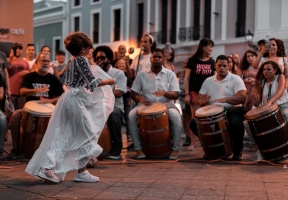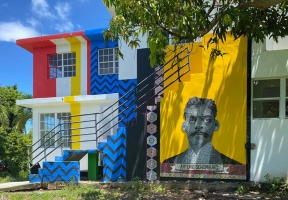

Black History Month was founded to celebrate everything within the African diaspora and contributions to American history. That diaspora includes Puerto Rico’s unique culture marked by Spanish, Taino and prevalent African roots, which have impacted the richness of the traditions, cuisine and experiences found on the Island and are often overlooked.
Some of the Tastes of African Culture in Puerto Rico include:
Cuisine – Many popular Puerto Rican dishes date back to African influences including mofongo, bacalaitos, and pasteles.
Art – Many museums throughout the Island have permanent exhibitions of African culture and have gained international recognition. A new exhibition titled NEGRO/A/X Art Exhibit via Casa Afro in Piñones also highlights 20 afro-Puerto Rican artists; a 3D tour is offered online.
Dance – One of the most breathtaking demonstrations of Afro-Puerto Rican heritage is the Bomba; a rhythm played by two or more drums guided by the dancer’s feet.
Below answers by Corredor Afro, an art space in Loíza, Puerto Rico, that wants to establish creative and artistic links between the African Diaspora and Africa, and by Dr. María Elba Torres Muñoz, Director, Instituto Interdisciplinario y Multicultural, General Studies Faculty, University of Puerto Rico Río Piedras campus
Why do you think there is a lack of knowledge about the impact of Afro culture in Puerto Rico?
Abroad the Puerto Rican culture has been packed and as a monolithic, homogeneous culture. The typical Puerto Rican is not black in the minds of many visitors and neighboring nations as we as the United States. Nothing is farther from the truth. We are a diverse cultural tapestry that includes in a significant way African elements.
What place do African descendants play in Puerto Rico’s history and development?
The role of the Afro Puerto Ricans and residents of African descent has been central to developing the island’s cultural, social, and political identity. Unfortunately, more so as in the United States, many of their contributions are not part of the history books, school books, and the mainstream media. Again just like in the United States, African descendants from Puerto Rico have been changing that by producing history books, audiovisual materials, institutions, and legislation that starts and continues to reclaim historical facts and specifically the continuation of the Afro Puerto Ricans.
What are some present-day manifestations of Puerto Rico’s African Heritage?
The African heritage manifests itself in all aspects of the daily life of the Puerto Rican today. We feel it through our songs, dances, food, bodies, accent, and the way we talk, our vocabulary, and the way we love. Since the enslaved Africans arrived, they had to build a new country. They could not return to their countries of origin. Products and food were brought from Africa on the slave ships. Due to the climate and forced labor, these foods grew in the country and became part of the enslaved Africans’ diet. Music has always been intrinsically connected to spirituality, uniting the human with the invisible or divine. Those forces today persevere in Puerto Rico. All African history on the island has been a history of resistance in keeping our afro-descendant traditions; in the same way, Afro-Boricua art persists.









